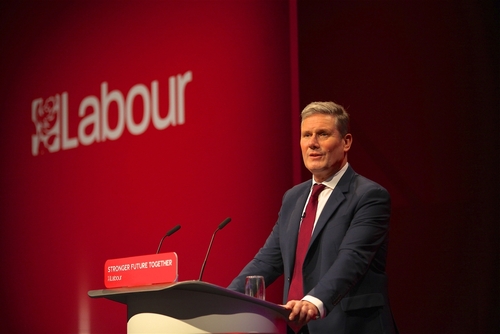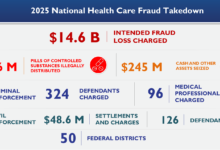What Labour is pledging for health and social care

Labour leader Sir Keir Starmer has unveiled his party’s 2024 general election manifesto.
Sir Keir, whose party is favourite to win the election, presented the party’s plans for the UK at an event in Manchester this morning (13 June).
“This changed Labour Party has a plan for growth. We are pro-business and pro-worker, the party of wealth creation,” he said.
The Labour leader emphasised that his party’s manifesto was a serious document, accusing other parties of a political “pantomime”.
He added: “Today we can turn a page, today we can lay a new foundation of stability.
“We serve working people as their ambition drives our country forward. Because there is so much potential in this country, so much possibility if we stand together as four nations and back the ambition people have for their families and their communities.
“Britain needs stability, not chaos… a return to the serious business of rebuilding our country.”
Nursing Times has broken down the Labour Party’s key promises for nursing, health and social care.
NHS infrastructure
Labour has said it would ringfence money to double the number of CT and MRI scanners in the NHS.
Like the incumbent government, the party committed to seeing through the New Hospitals Programme – the current version of which aims to build 40 hospitals by 2030, and rebuild seven which were built with reinforced autoclaved aerated concrete (RAAC).
Sir Keir’s party said it would improve procurement procedures for the NHS, bring in more incentives for “innovation” in life sciences, streamline recruitment to clinical trials and speed up regulatory approval for new treatments and health technology.
As well as this, the party pledged to digitise the red book, which is provided to parents to keep track of their children’s health records.
Preventative, community and public health
Labour’s manifesto places a lot of emphasis on moving healthcare out of the hospital where possible.
This will include “shift[ing] resources to primary care and community services”, the manifesto said.
In turn, the party pledged to train more GPs, guarantee face-to-face appointments for everyone who requests one and “deliver a modern appointment booking system”.
Labour also said it would “bring back the family doctor”, by incentivising GPs to see the same patient for subsequent appointments.
It said would also “take the pressure off GP surgeries” by giving pharmacists more powers to issue prescriptions– and allowing opticians and other professionals to make direct referrals to specialist services.
The party said it would trial ‘neighbourhood health centres’, which would host GPs, district nurses, care workers, physiotherapists, palliative care, mental health and other community health services.
On public health, the party pledged to continue the outgoing government’s work on banning tobacco products, as well as changing the packaging of vapes to prevent them appealing to children.
The party would also, the manifesto said, ban the advertisement of junk food towards children and the sale of highly caffeinated energy drinks to under-16s.
Labour’s manifesto also mentioned reducing “gambling-related harm” and exploring “further measures to keep everyone safe online”.
Waiting lists
As with the Conservatives, and many of the other parties, the Labour Party has placed reducing waiting lists as one of its top priorities. The manifesto pledged two million additional NHS appointments every year.
This, the manifesto said, will be achieved by “incentivising” staff to perform extra appointments out of hours, pooling resources between nearby hospitals to create shared waiting lists and use “spare capacity in the independent sector” to tackle the patient backlog.
The nursing and midwifery workforce
No specific pledges on nurse, or other healthcare worker, pay were made in the Labour manifesto.
However, the party promised to “reset relations with NHS staff” in order to stop treatment being impacted by strikes. It also said it would ensure that regular and independent workforce plans were published across the sector.
Labour also did not set any new targets on nursing recruitment and retention, though the manifesto pledged to deliver the NHS Long Term Workforce Plan, which contains its own promises on nursing, midwifery and medical staff numbers.
Health and social care funding
The health and social care section of Labour’s manifesto stated the NHS would “always be publicly owned and funded” under its government, suggesting that the party would continue to oppose privatisation.
Future health and social care secretary hopeful Wes Streeting said, in a video accompanying the manifesto’s launch, that the party’s key pledges in his portfolio would be paid for by removing the non-dom tax status loophole.
‘Non-dom’ refers to a government policy that allows UK residents whose permanent home is outside the UK to avoid paying UK tax on foreign income.
In his speech today to launch the manifesto, Sir Keir said “tough spending rules” would accompany a “pro-growth” approach to the economy, and that this would fund necessary public service improvements and reforms.
He ruled out raising national insurance contributions, which were cut multiple times across the last parliament.
Social care
Chief among Labour’s social care promises was undertaking a “programme of reform to create a National Care Service”, which will include building “consensus” for its creation.
The wording of this promise is a slight step back from the party’s 2019 manifesto pledge to “establish a comprehensive National Care Service”.
As well as this policy, the party pledged to create a “fair pay agreement” in adult social care that will cover pay, training, terms and conditions.
Labour would, if elected, also ask regulators to assess the role social care workers can play in “basic health treatment and monitoring” and would create “local partnership working” between health and social care providers to improve hospital discharges.
Mental health
Labour’s manifesto said current mental health legislation was “woefully out of date”, and promised to “modernise” it to improve racial equality in healthcare as well as better patient choice and autonomy.
The party also pledged to – like with physical health – bring down waiting times for mental health services.
To achieve this, Sir Keir’s Labour has said it will hire an additional 8,500 mental health staff who will be specially trained to support for those at-risk of suicide.
Similar to the Conservatives’ promise to open more early support hubs, the Labour Party pledged to create ‘young futures’ hubs, providing walk-in mental health services for young people.
NHS leadership
The party said it would create a new system of regulation for NHS managers, as well as establish a Royal College of Clinical Leadership to “champion the voice of clinicians”.
The Labour manifesto included a promise to support failing NHS trusts, in particular those struggling with maternity issues, and to set specific targets on closing the maternal mortality gap for Black and Asian women.
Other health-related policies
Labour promised to make improvements to the NHS app, including allowing it to be used to recruit patients to clinical trials and give people more control over their health.
In a section on health inequalities, the party said it would “prioritise” women’s health, stick to an existing pledge to end new HIV infections by 2030 and half the gap in healthy life expectancy between rich and poor areas of the UK.
The Labour Party, similar to the Conservatives, promised to “implement the expert recommendations” of the Cass Review into care for transgender children and young people.
It also said it would “modernise, simplify and reform” the current rules on gender recognition, but ruled out self-identification for transgender people, who currently require a diagnosis of gender dysphoria from doctors.
On dentistry, Labour promised 700,000 more dental appointments and to recruit more dentists in “areas that need them most”, as well as reforms to the dental contract.
Labour’s manifesto did not explicitly mention the Health and Care Visa, which has been criticised by some social care leaders for allowing the exploitation of immigrant care workers.
However, the manifesto made this blanket statement on visas: “Labour will not tolerate employers or recruitment agencies abusing the visa system.
“And we will not stand for breaches of employment law. Employers who flout the rules will be barred from hiring workers from abroad.”
Responses to the manifesto
Leaders from across health and social care have reacted to Sir Keir’s manifesto.
King’s Fund chief executive Sarah Woolnough said it “ticks many of the right boxes” on health, but that the specific commitments made by Labour were “unlikely” to deliver the scale of change promised by the party.
She welcomed the party’s promises to bring down waiting lists, move more of healthcare out of the hospital and into the community and invest in public health with cautious optimism.
However, Ms Woolnough said the party “dodged” the issue of social care reform, describing this part of Labour’s manifesto as “a plan to come up with a plan”.
“The current social care system in England is not fit for purpose and many people’s needs go unmet, yet it is one of the most over-looked and ignored policy challenges in recent decades,” she said.
“Labour’s plan for a fair pay agreement for care workers would help attract more people to work in the sector, but unless that increase in pay is matched with commensurate increases in local government funding, it will further squeeze already strained care provider and local council budgets.”
Sir Julian Hartley, chief executive of NHS Providers, welcomed the party’s recognition of the need to renew the NHS estate and equipment, as well as mentions of tackling racial inequality in healthcare.
“Support for the whole NHS workforce is crucial, from top down. Plans to regulate NHS managers must help trust leaders to nurture a thriving workforce and keep improving patient safety and the quality of care,” Sir Julian said.
“Health services continue to experience record demand and relentless pressure on A&E departments.
“The next government must work hand in hand with the ‘next generation’ NHS – right across hospital, mental health, community health and ambulance services – to create the picture of health we all want to see.”
Royal College of Nursing acting chief executive and general secretary Professor Nicola Ranger said Sir Keir’s plans to reduce the NHS backlog would have to “go beyond” that included in the manifesto, but broadly welcomed the party’s plans.
On the party’s workforce pledges, Professor Ranger said: “The current NHS Long Term Workforce Plan is way off course and nursing staff will have looked today for information on how that will be refreshed with government-funded degrees and financial support for students, which are essential to boost nurse numbers.
“Greater reassurance is needed alongside a plan to retain NHS staff, including with fair pay – we will be seeking negotiations to start immediately this summer to avoid further delays.”
Christina McAnea, Unison general secretary, said that, in her opinion, the manifesto showed that a Labour government could “rebuilt a Britain broken after years of Tory austerity and chaos”.
Ms McAnea said: “Unlike the party that’s been in power for the past 14 years, a Labour government would be committed to public services.
“Essential services aren’t a drain on the public purse, but a driver of economic growth. The public wants good public services and they’re fed up of seeing them driven into the ground.”






